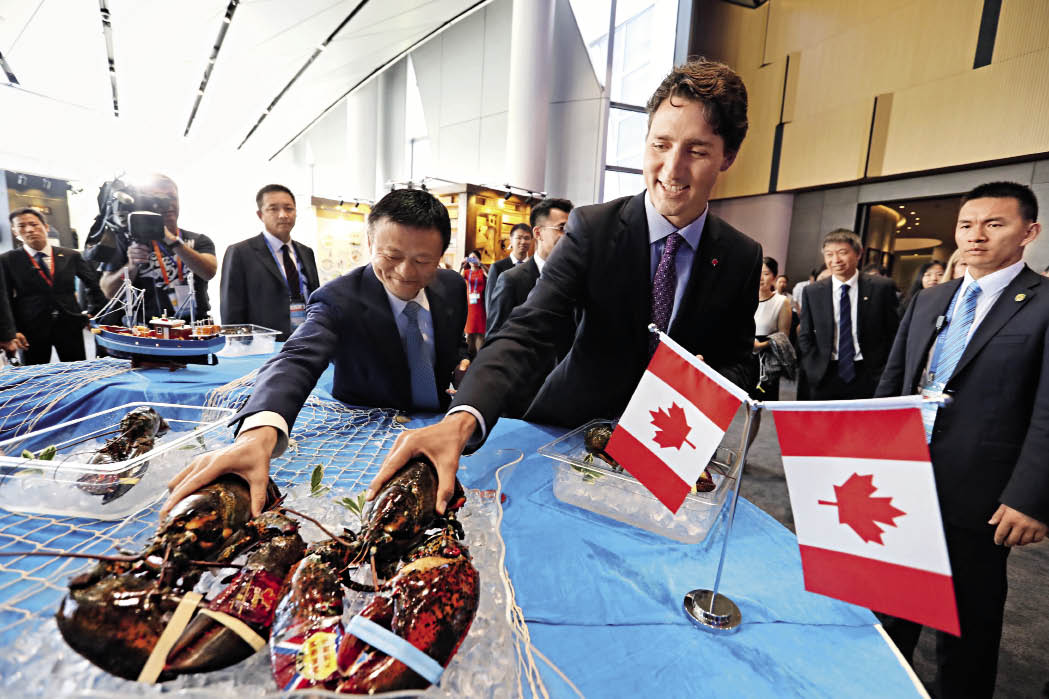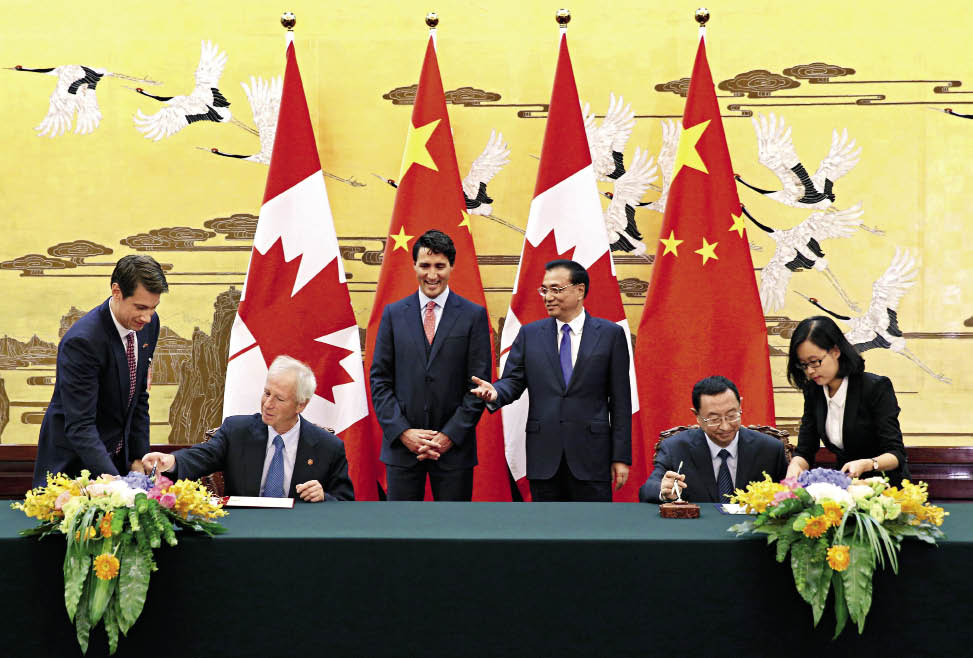風蕭蕭_Frank
以文會友Canadian PM Opens New Era of Canada-China Relations
ON September 7, after his first state visit to China, Canadian Prime Minister Justin Trudeau shared a fruitful outcome list on his Chinese Weibo (microblog): eight days in four cities, 56 deals with China worth C$1.2 billion, connecting Canadian companies with over 400 million Chinese online consumers.
Trudeau’s Chinese Goals
Justin Trudeau was sworn in as Canada’s Prime Minister last October, following in the footsteps of his late father, former Prime Minister Pierre Trudeau. Almost one year on, he has brought the Chinese and Canadian people a gift-pack overflowing with cooperative agreements in various areas, including driverless car technology, research into interactive holographic techniques, hydroplane programs, clean energy vehicles and the manufacture of their components and accessories.
Advocating multicultural, inclusive and innovative development, Justin Trudeau aims to gain popularity in China via his Weibo and WeChat (a cross-platform instant messaging service) accounts, on which he shares his thoughts and plans and maintains close contact with Chinese people online and offline.
Trudeau has his own clear goals. As he said on Weibo, “Canada’s principal goals for this visit were to build foundations for a stronger, more stable Canada-China relationship so as to boost Canada’s economic growth and strengthen the middle class.”

Justin Trudeau and Alibaba Group Executive Chairman Jack Ma launch the Canada Pavilion on Tmall on September 3 in Hangzhou.
During the G20 Hangzhou Summit, Trudeau emphasized the importance of developing the economy and benefiting the middle class, particularly women and young people. “Economic growth should benefit all, instead of the richest one percent only,” Trudeau said.
“We have to create a world in which people have the chance to succeed. And that is what China has proved itself to have done over the past few decades by lifting 700 million people out of poverty,” Trudeau said.
Talking about China-Canada cooperation, Trudeau said, “There is always more work to do and challenges to meet to see how we could get together and share solutions.”
Some tease Trudeau about being an idealist. Others criticize him for milking his good looks and his father’s political influence. However, none can deny that during his first year as Prime Minister, Trudeau has kept a clear mind and shown balanced judgment on multiple issues, including developing the national economy, strengthening the middle classes, expanding multilateral diplomatic relations, promoting free trade, and advocating multicultures and inclusive development. He has not just followed the lead of the United States.
Canada is the first North American country to apply for AIIB (Asian Infrastructure Investment Bank) membership. In an interview with CCTV NEWS, Trudeau said that Canada has the expertise to build high-quality infrastructure in China, across Asia, and around the world. This is why Canada wants to join the excellent China-led AIIB initiative, because it provides opportunities – not just for Chinese citizens, but also for Asia as a whole – to gain access to good infrastructure.
“We know that the AIIB creates good jobs in the short term and leads to increased productivity and growth in the long term,” Trudeau said.
When talking about China’s important role in the G20, Trudeau said, “The reason why we need not only the G20, but also the G7 is that we need China to be involved in discussions about the global economy. The concept of inclusive growth, innovation, investment in the future, and opportunities for everyone proposed by President Xi tallies with Canada’s development needs.”
Actions Speaks Louder than Words
During an exclusive interview with China Today last April, the Ambassador of Canada to China Guy Saint-Jacques, said Justin Trudeau had intimated a number of times that he wanted to expand relations with China. In the mandate letter he gave to Chrystia Freeland, the Federal Minister of International Trade, he specifically stated that she should look at ways to expand trade and economic relations with China.
Chrystia Freeland was also present at the G20 Hangzhou Summit information center, and gave interviews to both Chinese and foreign media representatives.
Freeland said that the agreements between the two countries denote growth opportunities for Canadian companies in key priority sectors, and that they are therefore an embodiment of the summit’s theme “building an innovative, invigorated, interconnected and inclusive world economy.”
China is playing an increasingly important role in shaping world politics and driving global economic growth. Canada, meanwhile, is working to renew ties with China to help promote the economy, strengthen the middle class, and develop long-lasting ties between the peoples of both countries.
“China is now playing a unique global role as the world’s second largest economy and also an emerging economy. I think the G20 Summit constitutes a great opportunity for both developed and developing countries to meet,” Sarah Scott, correspondent for the Toronto-based Canadian English-language newspaper The National Post, told China Today during the G20 Summit in Hangzhou.
Scott said that the Canadian contingent was gratified at the signing of 56 new commercial contracts and agreements between Canadian and Chinese companies, worth C$1.2 billion.
A joint press release from the People’s Republic of China and Canada was also announced on September 1. The 17 cooperation deals mentioned involve cultural exchanges, investment, and partnership and collaborative ventures. Both sides announced the establishment of the annual dialogue between the Premier of China and the Prime Minister of Canada, and also mentioned China’s warm response to Canada’s decision to apply for membership of the AIIB. The press release also talked about the establishment of the China-Canada High-Level National Security and Rule of Law Dialogue, enhanced efforts to address climate change through full and effective implementation of the historic Paris Agreement, and the announcement that 2018 will be the China-Canada Year of Tourism. China will hence authorize the opening of seven additional Canadian Visa Application Centers in China.
Inner Voices of Chinese and Canadian Citizens
Before Trudeau’s visit to China, American media reported that a canola dispute threatened to overshadow his trip. However, the joint press release on September 1 offered a preliminary solution. The two parties announced that quarantine authorities on both sides are actively consulting and researching science-based measures related to the canola dispute to find a timely solution. During this transitional period, canola trade between China and Canada will continue under the current quarantine regulation (August 2016).

Chinese Premier Li Keqiang and Canadian Prime Minister Justin Trudeau witness the signing of various cooperative agreements in Beijing on August 31, 2016.
The Chicago Tribune said in an article on August 24, that from September 1, the Chinese government would enforce stricter standards for the approval of Canadian canola imports, which could suspend an export program worth C$2 billion. Fortunately, American worries were unfounded.
Companies, media representatives, and people from both China and Canada gave positive feedback on Trudeau’s China trip. Gregg Serles, vice president of worldwide sales for vitamin company Jamieson Laboratories Ltd., said he hopes Trudeau’s trip will help attract more Chinese customers to a new Canada Pavilion on Alibaba Group’s e-commerce website Tmall.com, which serves 400 million online consumers.
“He’s so very well received, and people are impressed with his positivity,” Serles said at the Alibaba headquarters in Hangzhou. “I think he’s done a great job.”
“I believe Canadian products enjoy a good reputation,” said John Gu, vice president of Asia-Pacific for Clearwater, which sells Canadian lobsters to China.
“The economic exchanges between Zhejiang Province and Canada have evolved from traditional trade in goods and services to direct investment, which will hopefully transform the province’s industrial structure,” commented Wen Yanbing, dean of the Economics Department at Zhejiang University of Finance and Economics. “Along with the Belt and Road Initiative, China and Canada will increase investment in the manufacturing sectors relating to textiles, vehicle accessories, and general equipment, as well as real estate development and management, which will definitely provide more cooperative opportunities for Zhejiang businessmen.”
Mark Rowswell, the Canadian comedian known as Da Shan and a household name in China, said Trudeau is definitely the most famous Canadian leader since his father Pierre Trudeau.
“We’re happy to see the new government’s changing policies concerning China. Prime Minister Trudeau’s aim during his trip to China is to improve bilateral relations between China and Canada. Frankly speaking, I think he has been very successful,” Canadian correspondent Sarah Scott said.
- Chinese premier eyes more cooperation with Guinea Bissau
- Greek-Chinese cultural dialogue can advance resolution of common challenges: Minister
- Chinese premier to meet leaders of Portuguese-speaking countries in Macao
- China's World Cup hope slim after a defeat to Syria
- China Focus: China publishes new action plan on human rights




